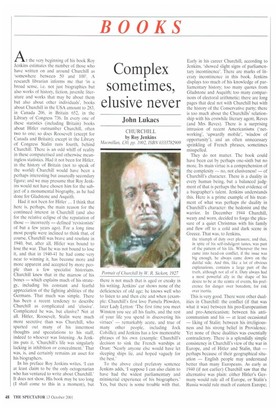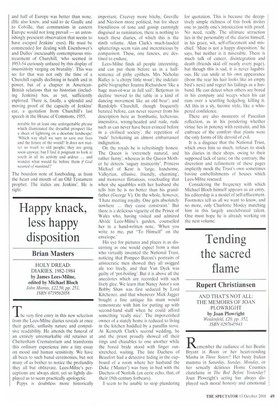Complex sometimes, elusive never
At the very beginning of his book Roy Jenkins estimates the number of those who have written on and around Churchill as 'somewhere between 50 and 100'. A research librarian informs me that 'in a broad sense, i.e. not just biographies but also works of history, fiction, juvenile literature and works that may be about them but also about other individuals', books about Churchill in the USA amount to 283, in Canada 206, in Britain 652, in the Library of Congress 736. In every one of these statistics (including Britain) books about Hitler outnumber Churchill, often two to one so does Roosevelt (except for Canada and Britain); except in the Library of Congress Stalin runs fourth, behind Churchill. There is an odd whiff of reality in these computerised and otherwise meaningless statistics. Had it not been for Hitler, in the history of Britain (not to speak of the world) Churchill would have been a perhaps interesting but assuredly secondary figure; and we may presume that Roy Jenkins would not have chosen him for the subject of a monumental biography, as he had done for Gladstone and Asquith.
Had it not been for Hitler ... I think that here is, perhaps, the main reason for the continued interest in Churchill (and also for the relative eclipse of the reputation of those — incorrectly — defined 'revisionists' of but a few years ago). For a long time most people were inclined to think that, of course, Churchill was brave and resolute in 1940, but, after all, Hitler was bound to lose the war. That he was not bound to lose it, and that in 1940-41 he had come very near to winning it, has become more and more apparent and accepted by more people than a few specialist historians. Churchill knew that in the marrow of his bones — which explains much of his strategy, including his constant and fearful appreciation of the fighting abilities of the Germans. That much was simple. There has been a recent tendency to describe Churchill as complicated and 'elusive'. Complicated he was, but elusive? Not at all. Hitler, Roosevelt. Stalin were much more secretive than was Churchill, who spurted out many of his innermost thoughts and speculations to his staff, indeed to whoever was listening. As Jenkins puts it, 'Churchill's life was singularly lacking in inhibition or concealment.' That was, is, and certainly remains an asset for his biographers.
In his preface Roy Jenkins writes, 'I can at least claim to be the only octogenarian who has ventured to write about Churchill.' It does not show. His book may be too long (I shall come to this in a moment), but there is not much that is aged or creaky in his writing. Jenkins' ear shows none of the deficiencies of old age; he knows well who to listen to and then cite and when (example: Churchill's first love Pamela Plowden, later Lady Lytton: 'The first time you meet Winston you see all his faults, and the rest of your life you spend in discovering his virtues' — remarkably acute, and true of many other people, including Jock Colville); and Jenkins has a few memorable phrases of his own (example: Churchill's decision to sink the French warships at Oran: 'Nearly anyone else would have let sleeping ships lie, and hoped vaguely for the best.'
To the above cited prefatory sentence Jenkins adds, 'I suppose I can also claim to have had the widest parliamentary and ministerial experience of his biographers.' Yes, but there is some trouble with that.
Early in his career Churchill, according to Jenkins, 'showed slight signs of parliamentary incontinence'. There are marks of literaryincontinence in this book. Jenkins displays too much of his knowledge of parliamentary history; too many quotes from Gladstone and Asquith; too many comparisons of electoral arithmetic; there are long pages that deal not with Churchill but with the history of the Conservative party; there is too much about the Churchills' relationship with his erstwhile literary agent, Reyes (and Mrs Reyes). There is a surprising intrusion of recent Americanisms ('networking', 'upwardly mobile', 'window of opportunity'), and an often unnecessary sprinkling of French phrases, sometimes misspelled.
They do not matter. The book could have been cut by perhaps one-sixth but no more. Its main virtue is a comprehension of the complexity — no, not elusiveness! — of Churchill's character. There is a duality in every human being, but a balanced judgment of that is perhaps the best evidence of a biographer's talent. Jenkins understands this. Here is a prime example of his treatment of what was perhaps the duality in Churchill's character: the hedonist and the warrior. In December 1944 Churchill, weary and worn, decided to forgo the pleasure of a quiet Christmas with his family and flew off to a cold and dark scene in Greece. That was, to Jenkins,
the triumph of duty over pleasure, and that, in spite of his self-indulgent tastes, was part of the pattern of his life. Whenever the two came into head-on conflict, if the issue was big enough, he always came down on the dutiful side. And this, like a lot of obvious explanations, contains a large part of the truth, although not all of it. Duty always had a most powerful ally in the shape of his desire to be at the centre of events, his preference for danger over boredom, for risk over inertia.
This is very good. There were other dualities in Churchill: the conflict (if that was what it was) between his pro-Europeanism and pro-Americanism; between his anticommunism and his — at least occasional — liking of Stalin: between his irreligiousness and his strong belief in Providence. Yet none of these dualities was essentially contradictory. There is a splendidly simple consistency in Churchill's view of the war in Europe, and of Hitler and Stalin, that — perhaps because of their geographical situation — English people may understand better than many Europeans. As early as 1940 (if not earlier) Churchill saw that the alternative was plain: either Hitler's Germany would rule all of Europe, or Stalin's Russia would rule much of eastern Europe;
and half of Europe was better than none. (He also knew, and said to de Gaulle and to Colville, that communism in eastern Europe would not long prevail — an astonishingly prescient observation that seems to have escaped Jenkins' eyes). He must be commended for dealing with Eisenhower's and Dulles' inexcusably contemptuous mistreatment of Churchill, `who seemed in 1953-54 curiously unfazed by this display of insensitivity verging on brutality'. This was so: for that was not only the time of a Churchill rapidly declining in health and in power, but of a chapter in AmericanBritish relations that no historian (including Jenkins) has, as yet, sufficiently explored. There is, finally, a splendid and moving proof of the capacity of Jenkins' ear, a quotation from Churchill's last speech in the House of Commons, 1955, notable for at least one unforgettable phrase which illuminated the dreadful prospect like a sheet of lightning on a desolate landscape: .Which way shall we turn to save our lives and the future of the world? It does not matter so much to old people; they are going soon anyway; but I find it poignant to look at youth in all its activity and ardour ... and wonder what would lie before them if God wearied of mankind?'



























































































 Previous page
Previous page